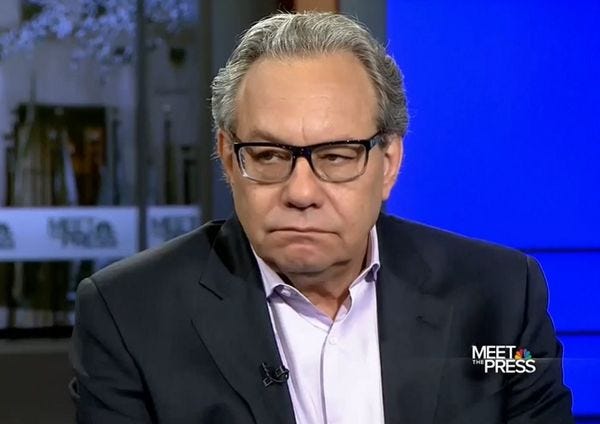Chuck Todd Of All People Worries Comedy Has Dumbed Down Politics
Despite a crappy straw-man premise, Meet the Press aired a fairly decent discussion of the role of comedy in political discussion Sunday, mostly thanks to a panel that included comedians and writers Lewis Black, Laura Krafft, and W. Kamau Bell, and not hindered too much by host Chuck Todd. Todd introduced the segment by referring to a recent piece in Salon that argues that Jon Stewart's "both sides do it" irony is not especially good political satire, which Todd immediately mischaracterized as saying that "political satire is dumbing down politics." The Salon piece, by Elias Isquith, actually says nothing of the sort. Isquith argues that Stewart's particular style of satire is all too often superficial, and that in an effort to not seem biased, Stewart "tends to inspire glib cynicism more than outrage or understanding." So yes, in setting up the segment, Chuck Todd dumbed down the very piece that he claimed inspired it. Happily, once he turned the discussion over to the actual comedians, things got a lot better:
Lewis Black led off by rejecting Todd's premise altogether:
That you could say we’re somehow dumbing down something that’s been dumbed down over the course of my life, that it would even be possible for us to take it further, is beyond belief ... The thing that has struck me about the last twenty years is that we've moved closer and closer to where we're living on the corner where satire and reality intersect.
Now, we're also going to have to say that we're not sure we agree with you a hundred percent on your police work, there, Lewis -- after all, Tom Lehrer famously said that political satire became obsolete when they awarded Henry Kissinger the Nobel Peace Prize. But the point works well enough; Black went on to blame all this on the 24-hour media saturation, which makes intuitive sense, but then again, we're inclined to insist that it was ever thus. We have always been a nation of boobs, as any fan of Mark Twain or H.L. Mencken knows.
Laura Krafft, who wrote for The Colbert Report, stood by a 2007 interview where she said she hoped that people would "only use our shows for what they are, a satirical addendum to the news," and added that she believes that people in general are more sophisticated about politics than in Olden Times: there may be a lot more superficial coverage of news, but there are also more opportunities to explore political issues in depth -- and satire is part of that. We'll agree with her on that one -- if you want to see superficial politics, just look at the early TV ads for the Eisenhower campaign in 1952, which make a Ted Cruz press conference look substantial.
W. Kamau Bell added that he was pretty sure we'd be pretty cynical even without comedy:
Have you been on Twitter lately? Have you been on Facebook? The cynicism is there. If anything, the Daily Show gives you some hope -- "I can laugh my way through this."
Krafft added that she thinks that comedy benefits from the assumption that it can be more truthful than "straight" news -- even though comedians get paid, too. Bell added that the personality of the comedian helps:
I think that when people they watch Jon Stewart or John Oliver, they feel like they are at least getting that person’s perspective. I don’t think people believe with the news, you know, you feel like you’re getting a corporation’s perspective.
Black rejected he idea that comedy is responsible for cynicism, attributing that more to the sense that Washington and Hollywood are self-contained bubbles that have few connections to real people anymore -- and while that's far from new, we have many more chances to see that disconnect through the media, and it's ripe for satire. If anything, he says, he was surprised that people attending his shows "were angrier than I was." He also said that he'd never be able to host Meet the Press, telling Todd, "I have watched you and everybody elsewhere: somebody comes on, and I don’t know how you do it, because I’d be barking at them."
Todd agreed that mainstream news isn't allowed to bark at guests:
We all sit there because we know the first time we bark is the last time we do the show. There’s something sometimes, where all of a sudden nobody will come on your show. There's that balancing thing.
Riffing on that point, Bell noted that comedians are allowed to bark -- and so is Fox News, which isn't afraid of being one-sided, while more respectable networks may distance themselves by playing a clip of a comedian "barking":
They'll play a clip of The Daily Show or they'll play a clip of John Oliver, and go, ‘Look at this guy barking. Anyway, back to a reasonable discussion."
It was pretty good, we thought -- once you got past that seriously dumbed-down premise, at least.
[ Salon / Meet The Press / TPM / RawStory ]




On a stick?
Sorry for this, but an Electrolux in a vacuum chamber wouldn't suck.
/metaphornazi